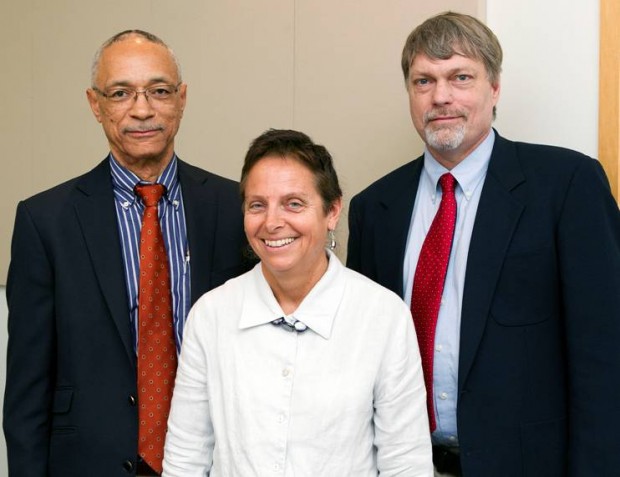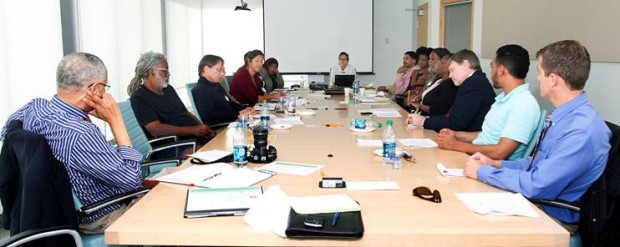Final Phase Of Agriculture Strategy Preparation
International Agricultural Economist Dr. Ann Gordon is in Bermuda this week to gather information for the creation of a report which will map the way forward for the advancement of Bermuda’s agriculture from a crops perspective.
She is accompanied by Mr. Dieter Fischer, who is a consultant to the World Bank on matters of international agribusiness investment.
Both Dr. Gordon and Mr. Fischer have been on the island this week collecting data, holding meetings, visiting farms and supermarkets, and engaging with various stakeholders in both the public and private sectors.
A spokesperson said, “This work marks entry into the final phase of work on preparing a National Agriculture Strategy – highlighted in this year’s Speech from the Throne – which is anticipated to be completed early in the New Year.
“The aim of the strategy would be to increase the production of food by setting conditions that will encourage investment in farming and the production of crops.”
“The final details of the strategy are being mapped out following this week’s consultation with overseas agricultural economists,” explained Director of Environmental Protection Dr. Frederick Ming. “We are seeking to create a vision for a new understanding of what agriculture is, what it could be, and the opportunities that are being lost by not bringing that vision into reality.
“If the Government and private sector can come together and implement the opportunities contained in the strategy there’s no doubt that it will lead to new opportunities for investment, business and new job opportunities.”
[L-R] Director of Environmental Protection Dr. Frederick Ming; Agricultural Economist Dr. Ann Gordon; Mr. Dieter Fischer, consultant to the World Bank.
Today [Nov 27] saw a series of meetings take place including a special agriculture policy session in the morning and a stakeholder engagement session in the afternoon.
The spokesperson said, “Dr. Gordon gave an extremely detailed presentation entitled, ‘Agriculture in Bermuda: Key Issues and Opportunities’ which highlighted, among many other things, Bermuda’s history of agricultural exports; the fact that we produce quality produce with high yields for many crops; that there is room in the market for more Bermudian produce; that we possess an educated, experienced farming population; that we have access to cutting edge new technology; that a wide range of vegetables can be grown here; that there is a preference for Bermudian supply of some items over imported options; and that there is scope for ‘edible landscaping’ in the public & private sectors.
“She stressed the need to encourage home gardening among Bermudians – something which will be heavily incorporated into the Agriculture Strategy.
“Job creation, food security and economic diversification were some of the myriad of reasons she gave for supporting agriculture in Bermuda.
“Some of the challenges she discussed were: the limited availability of agricultural land in Bermuda; the threat of feral chickens; the pressure to convert land for development; land fragmentation; and a small economy which can produce monopolistic tendencies.
Participants at the stakeholder engagement session regarding Agriculture in Bermuda.
“Dr. Gordon suggested the Agricultural Strategy should create economically and environmentally sustainable solutions; build on the sector’s current strengths; and clearly define “agricultural use” for zoning purposes to protect sites suitable for cultivation.
“Other suggestions included incorporating some agricultural activities into the school curricula; the creation of on-farm opportunities for Bermudians; and improving linkages between Government and farmers.
“Through the implementation of a National Agriculture Strategy, Government will amend the Agriculture Act 1930 to clearly define agriculture, increase the protection of arable land and topsoil, stimulate investment, encourage community home gardening, and tackle the challenging issue of Government land leases for dairy and produce farming.
The Department of Environmental Protection will be leading this initiative.”
“Currently, we are heavily dependent on the importation of food, and would like to see an increase in food produced locally,” said Dr. Ming. “Agriculture currently accounts for less than 1 per cent of gross domestic product. This needs to change.
“Food security includes local production through agriculture, in addition to the provision of safeguards, laws and policies that would minimize the risk of interrupting access to imported food. It involves self-sufficiency in local production, but also having access to supply chains that can guarantee an adequate and continuous supply of food that is imported to the island.
“Everyone, regardless of living circumstances, can produce an edible plant. There is something in this for everybody.”
Read More About
Category: All, Environment, News




now this is something we should all be excited about! save on groceries, while getting a bit of exercise, all to eat a nice meal with fresh vegetables from your own garden!
A very good PLP initiative……continued by the OBA.
Use the Government owned Islands that we do not use for anything accept camping trips.
except
oh oh what is World Bank rep here for? hmmm…. Bermuda too small for exploitation. shoooo go away. Now where is the talk about Cannabis cultivation?
I sure hope that official meetings were held with Darren O’Doherty who was in Bermuda recently to share with us some really exciting and interesting information about Regenerative Agriculture. I feel sure that with his ideas would spark interest in farming and agriculture in and for our country.
Interesting – wonder if they looked at the research undertaken 3 yrs ago – available at http://www.best.org.bm/index.php?view=article&id=267%3Athe-role-of-agriculture-in-bermudas-future&option=com_content&Itemid=33
Do the large importers have multi-year agreements with the overseas suppliers of agricultural produce? How much perishable produce is wasted weekly? Is there any incentive for the large importers to allow the government storage of the locally-produced fruits/vegetables?
We are painfully reminded of how in the 1970 – 1980′s the Farmers’ persistent pleading for repair of the Government Prospect refrigerated food storage facility went unheeded, just at the time of formation of the supermarket chains and decline in the neighborhood grocers.
Community gardening and animal husbandry areas could be installed in every parish/constituency. This could liven up the Ag show re competition!